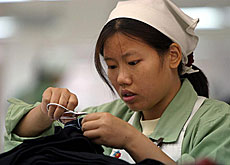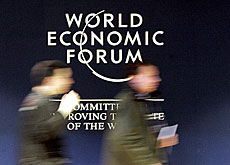Leuenberger pleads for a more creative world

Swiss President Moritz Leuenberger has stressed the need for creativity and state arbitration at the opening of the World Economic Forum (WEF) meeting in Davos.
While Leuenberger called for the creation of a basic global market framework, German Chancellor Angela Merkel pleaded for free enterprise.
Referring to the conference’s motto, “The Creative Imperative”, Leuenberger said that the world’s problems required creative solutions but that a framework was required for creativity to develop and free competition could not achieve that on its own.
“Without social nets, freedom of opinion and education, innovative solutions cannot exist,” Leuenberger said. “Hungry people cannot be creative – they need all their energy simply to survive.”
He believed that without this social, economic and environmental arbitration, future generations would not be able to express their creativity and find solutions to global challenges.
Swiss-German understanding
Leuenberger also used the high-level meeting to exchange opinions with Angela Merkel on the ongoing dispute over flight paths to Switzerland’s main airport at Zurich.
A statement from Leuenberger’s office said the German chancellor – the only G8 leader to attend the meeting – had shown understanding for the delicate situation and had also promised Germany’s support on speeding up ratification of bilateral treaties with the European Union.
In her keynote speech, Merkel called for international bodies to develop common standards in social and environmental policy and push ahead with trade liberalisation.
She said the world needed to go further to develop common standards in areas such as social and environmental policy, a suggestion some developing countries view as disguised trade protectionism.
“I think bilateral agreements between individual groups in the world … will not get us very far,” she said. “We have to learn to reach agreements with each other in a global world.”
Too early
Merkel’s exhortations fell on deaf Swiss and American ears.
On Wednesday evening Swiss Economics Minister Joseph Deiss hosted an informal meeting of around 30 ministers to review stuttering world trade talks. He also met the United States trade representative, Robert Portman, to discuss a bilateral trade deal between Switzerland and the US.
After the meeting Deiss and Portman said it was too early to begin negotiations on a free-trade accord between the two countries.
However, they said they would continue to work towards closer economic ties, even if it is not a full bilateral trade deal.
“We are still convinced that it is necessary to deepen and increase our relations in the economic field,” Deiss said.
Portman said: “It’s a question of whether the Swiss are ready to reduce their tariffs and quotas on agricultural products and I’m hopeful that we can still come to an agreement.”
Poor deal
Portman’s confidence and desire for an eventual trade agreement was not shared by everyone.
Pascal Couchepin, the Swiss interior minister from the centre-right Radical Party, said on Wednesday that he did not think the limited benefits to industry and services of a free-trade accord with the US would make up for the sacrifice that would have to be made by farmers.
He said sales opportunities for Swiss farmers were slim in the US and that problems would arise concerning intellectual property, marks of origin and the obligation to declare certain things, such as meat with added hormones.
But Couchepin said he approved of a free-trade accord on agriculture with the EU. This, he said, would open up to Swiss farmers a market comprising 400 million people.
He said that in the EU it would also be possible for higher-quality products to command higher prices.
swissinfo with agencies
The five-day WEF meeting is expected to attract 2,340 participants from around 90 countries.
The line-up includes 15 heads of state or government, 60 cabinet ministers, 21 ambassadors, and 65 heads or senior officials of international organisations.
More than 490 participants come from civil society, including 31 heads of non-governmental organisations, 13 union leaders and 23 religious leaders.
5,500 army personnel have been deployed in a SFr8.5 million ($6.75 million) security operation.
Key themes at the meeting include the emergence of China and India, the changing economic landscape, the impact of technology and digitalisation, and building trust in leaders and institutions.
Leading global figures in Davos include UN Secretary-General Kofi Annan; Paul Wolfowitz, president of the World Bank; German Chancellor Angela Merkel; Nobel peace prize-winner Mohamed ElBaradei, director-general of the International Atomic Energy Agency.

In compliance with the JTI standards
More: SWI swissinfo.ch certified by the Journalism Trust Initiative











You can find an overview of ongoing debates with our journalists here . Please join us!
If you want to start a conversation about a topic raised in this article or want to report factual errors, email us at english@swissinfo.ch.